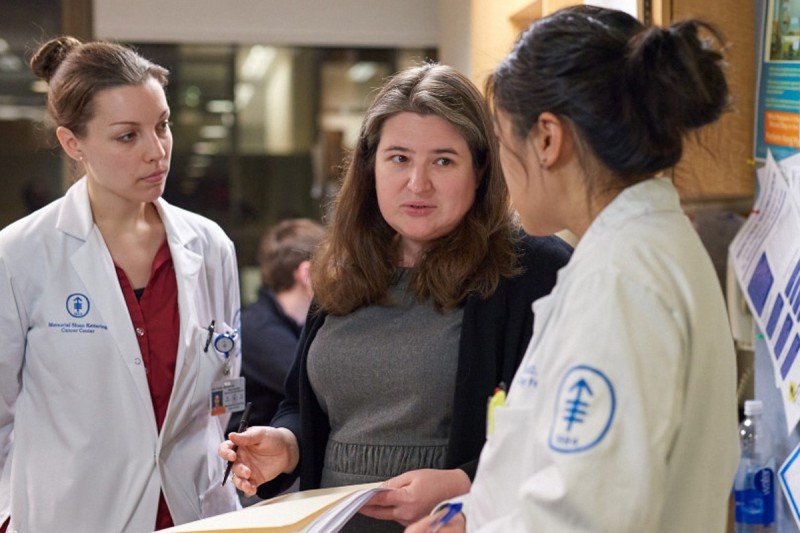
The category of soft tissue sarcoma describes a group of rare and challenging cancers — more than 50 types — which grow in the body’s supportive and connective tissues, including muscles, tendons, nerve fibers, and cartilage. Most types of sarcoma have good survival rates if they are caught early, but they are much harder to treat once they begin to spread. (Cancers that originate in the bone are also sarcomas.)
Most physicians see only a handful of soft tissue sarcoma cases in their whole career. But Memorial Sloan Kettering has an entire team of experts devoted to improving diagnosis and treatment of sarcoma and advancing patient care.
Surgeon Aimee Crago specializes in the treatment of sarcoma, including liposarcoma and desmoid tumors. “Most of the more common cancers that we think about — such as breast, lung, and colon cancers — are tumors called carcinomas that grow from the linings of our organs,” she says. “I tell my patients that sarcomas come from the tissues between our organs. And in the same way that different carcinomas behave differently, sarcomas have different behaviors based on their type.”
The Challenges of Surgery
Sarcomas can occur anywhere in the body, including the arms and legs, areas of the torso in and around vital organs, and the face and neck. “When you’re removing a sarcoma, you always have to think about whether surgery will disrupt how a patient is able to function,” Dr. Crago says. For example, a sarcoma in the thigh may affect the ability to walk, while a sarcoma near the jaw may make things like talking and chewing difficult.
“And because each sarcoma behaves differently, it’s important to know the sarcoma subtype when we plan our surgeries,” she says. “If a tumor is more likely to come back, we may have to be more aggressive when we remove it.”
Genetic Studies Lead to New Approaches
In addition to being a surgeon, Dr. Crago also conducts laboratory research on the genetics of sarcoma. That research is leading to a better understanding of how the disease develops and behaves, which helps to improve care for patients.
“A lot of the new information we’ve learned is about the specific genetic events that cause each of the different sarcoma types to form,” she says. “This understanding lets our pathologists better define each patient’s tumor. It also enables research into how these genetic mutations affect the cell and allow it to become cancer — and ultimately how they can be targeted to turn off cancer growth.”
One of the sarcoma types that Dr. Crago focuses on in her laboratory work is liposarcoma, which originates in fat cells and makes up about 20% of all soft tissue sarcomas. These tumors can appear anywhere in the body, but are most common in the thigh and abdomen. “In liposarcomas, we’re learning more about the genes that drive them, and we’re able to develop drugs that target them,” she says.
A Focus on Desmoid Tumors
Another type of tumor that Dr. Crago investigates is desmoid tumors, also known as desmoid fibromatosis. Desmoid tumors arise in the soft tissues, but not all experts agree on whether they are sarcomas — in large part because they don’t have the ability to spread to other parts of the body like most sarcomas do. Their unusual characteristics make treating them difficult.
“Desmoid tumors are a challenge because once they develop they often keep coming back in the same place,” Dr. Crago says. “We try not to operate on them unless they are really affecting how a patient functions, because the surgery can cause more complications than the tumors themselves. Another thing that’s interesting is that they often don’t grow beyond a certain size, and may even spontaneously regress.”
Because of the potential harm in surgically removing these tumors, researchers are looking for ways to treat them with drugs. Dr. Crago and her colleagues are currently completing a phase III clinical trial evaluating the drug sorafenib (Nexavar®, originally approved to treat kidney cancer) in desmoid tumors.
“Because MSK sees such a large number of patients , we are able to conduct clinical trials for soft tissue sarcoma that look at new treatments for patients,” she says. “This gives us — and our patients — the unique opportunity to gain access to these drugs much sooner.”





